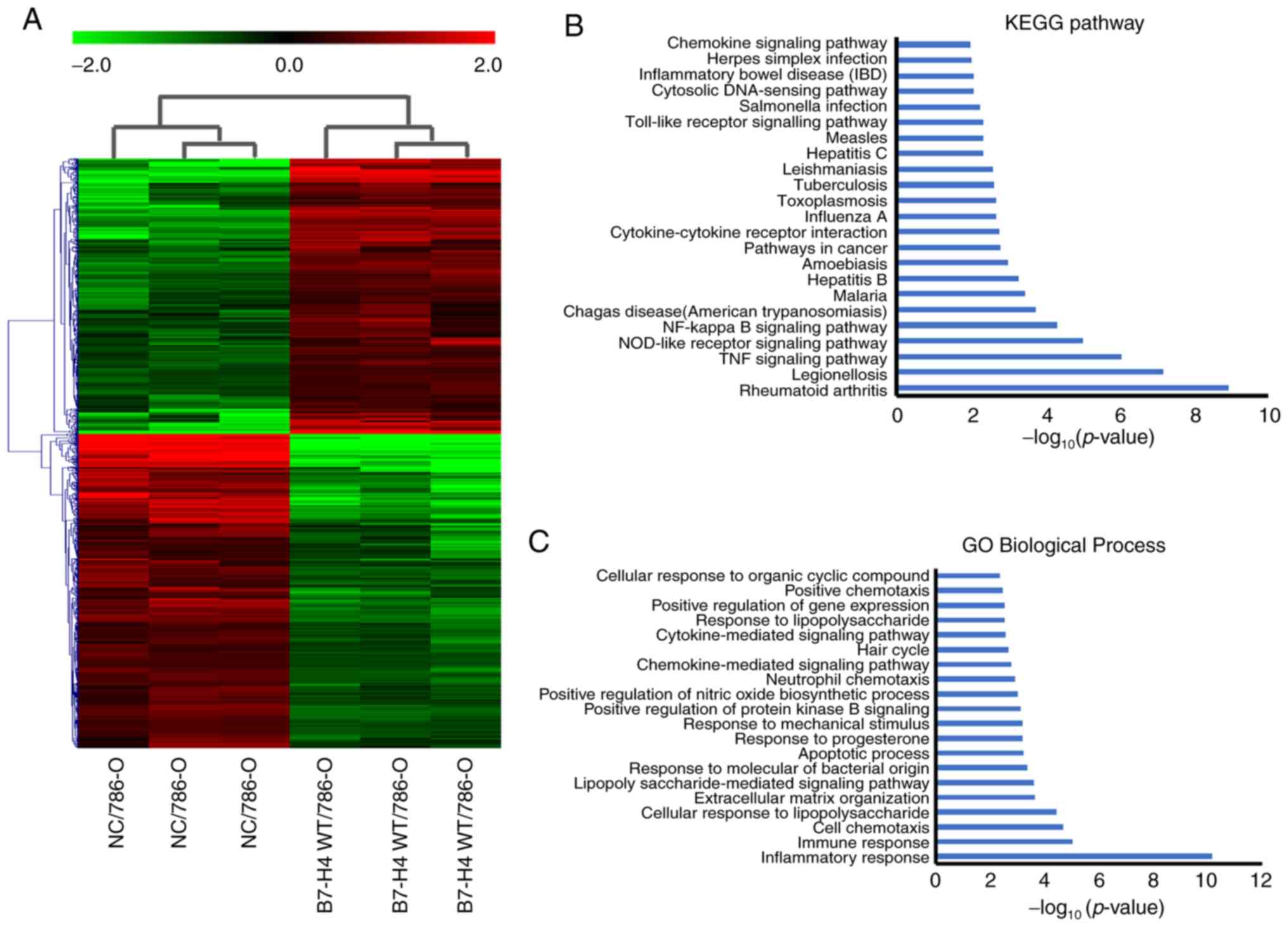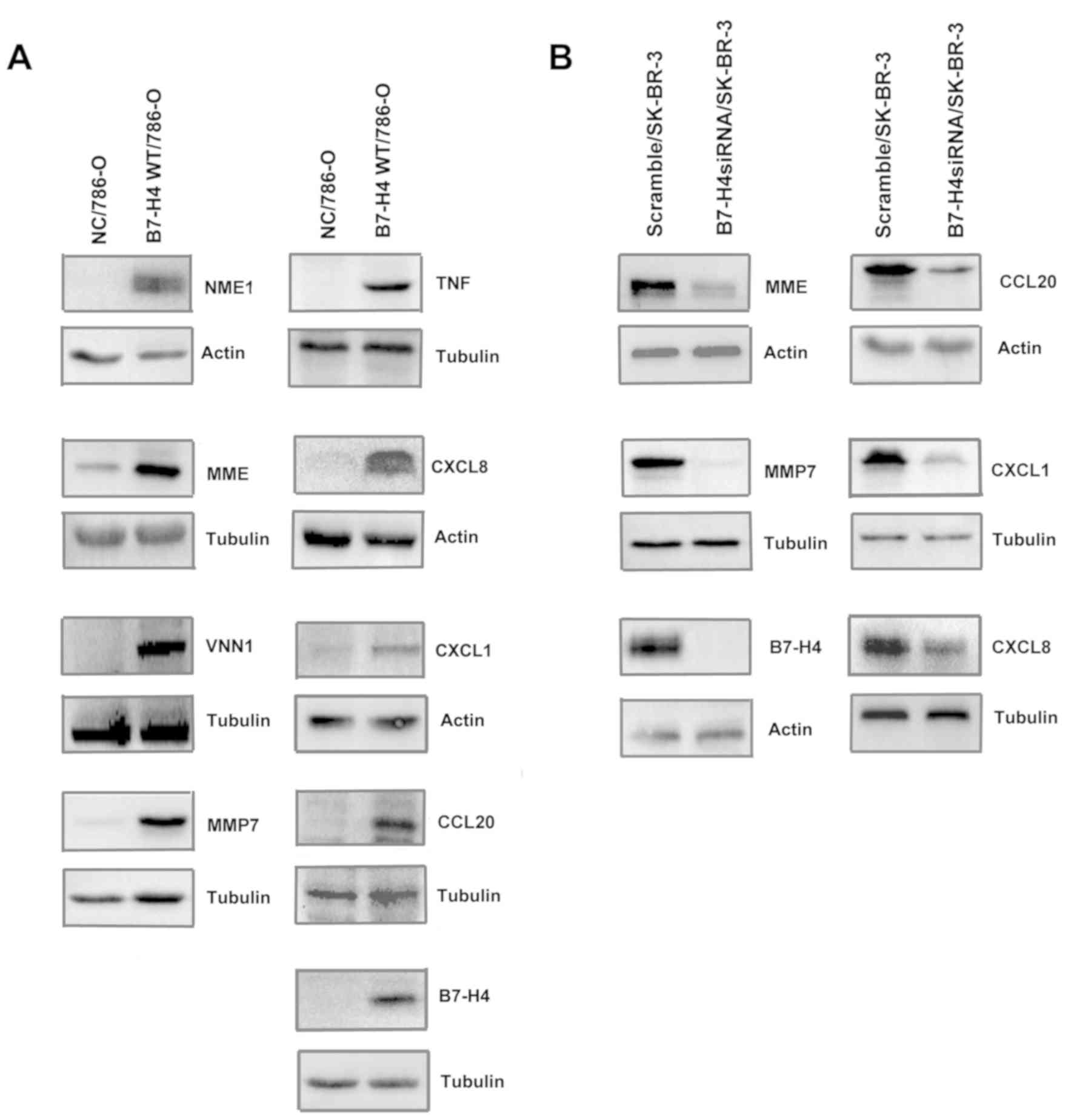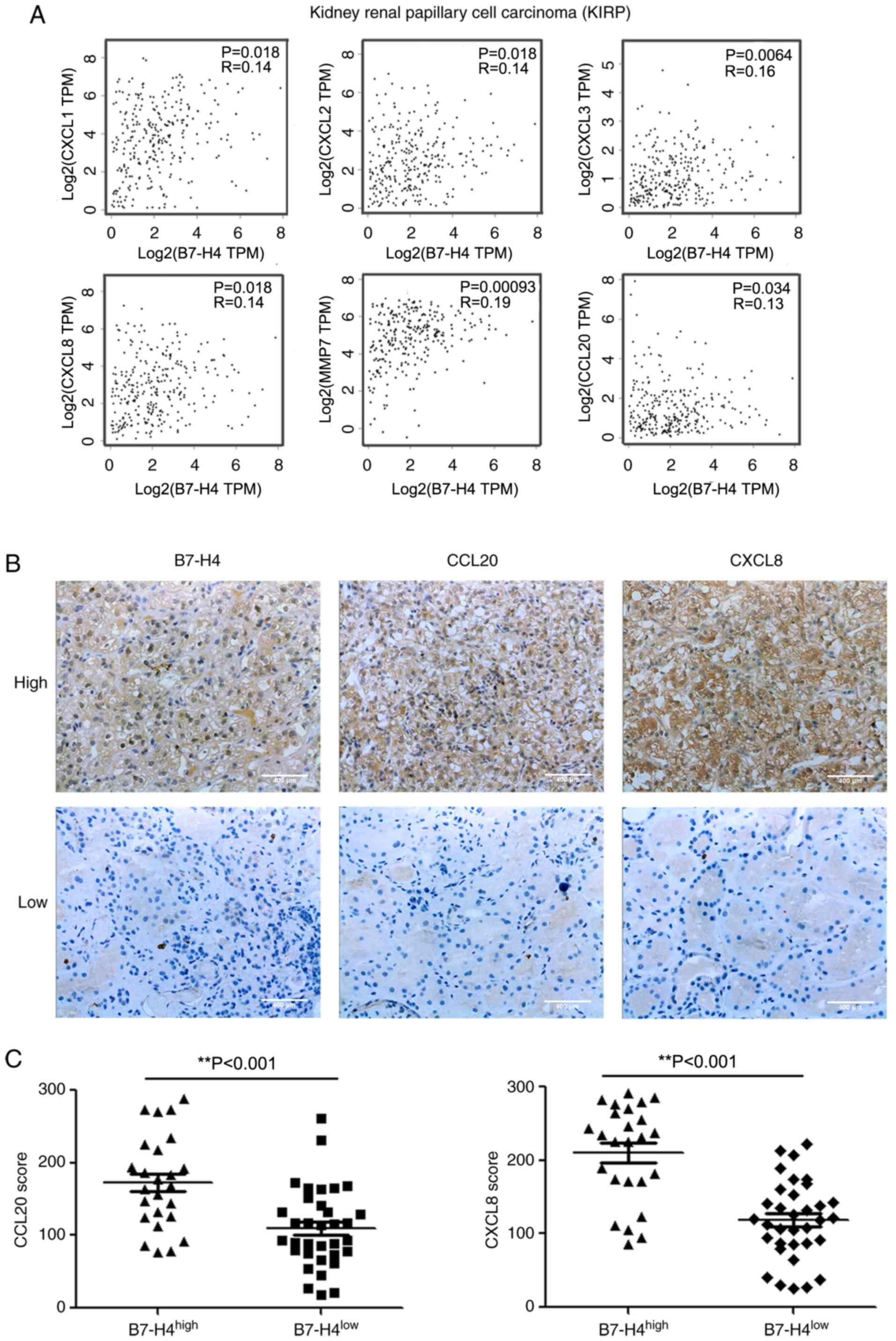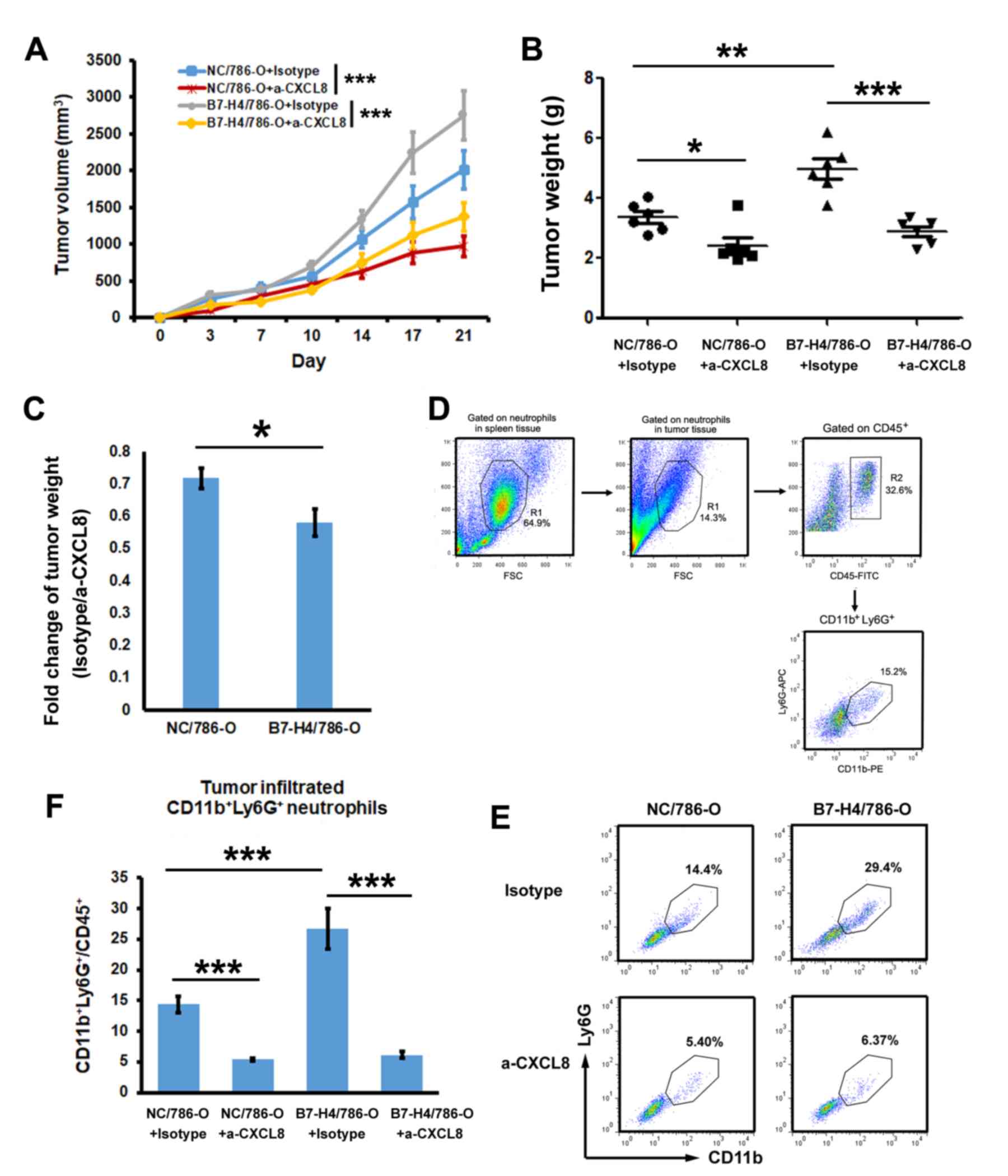|
1
|
Ferlay J, Soerjomataram I, Dikshit R, Eser
S, Mathers C, Rebelo M, Parkin DM, Forman D and Bray F: Cancer
incidence and mortality worldwide: Sources, methods and major
patterns in GLOBOCAN 2012. Int J Cancer. 136:E359–E386. 2015.
View Article : Google Scholar : PubMed/NCBI
|
|
2
|
Rooney MS, Shukla SA, Wu CJ, Getz G and
Hacohen N: Molecular and genetic properties of tumors associated
with local immune cytolytic activity. Cell. 160:48–61. 2015.
View Article : Google Scholar : PubMed/NCBI
|
|
3
|
Santoni M, Berardi R, Amantini C,
Burattini L, Santini D, Santoni G and Cascinu S: Role of natural
and adaptive immunity in renal cell carcinoma response to
VEGFR-TKIs and mTOR inhibitor. Int J Cancer. 134:2772–2777. 2014.
View Article : Google Scholar : PubMed/NCBI
|
|
4
|
Motzer RJ, Hutson TE, Tomczak P,
Michaelson MD, Bukowski RM, Rixe O, Oudard S, Negrier S, Szczylik
C, Kim ST, et al: Sunitinib versus interferon alfa in metastatic
renal-cell carcinoma. N Engl J Med. 356:115–124. 2007. View Article : Google Scholar : PubMed/NCBI
|
|
5
|
Motzer RJ, Escudier B, McDermott DF,
George S, Hammers HJ, Srinivas S, Tykodi SS, Sosman JA, Procopio G,
Plimack ER, et al: Nivolumab versus everolimus in advanced
renal-cell carcinoma. N Engl J Med. 373:1803–1813. 2015. View Article : Google Scholar : PubMed/NCBI
|
|
6
|
Gill DM, Hahn AW, Hale P and Maughan BL:
Overview of current and future first-line systemic therapy for
metastatic clear cell renal cell carcinoma. Curr Treat Options
Oncol. 19:62018. View Article : Google Scholar : PubMed/NCBI
|
|
7
|
Kawashima A, Uemura M and Nonomura N:
Importance of multiparametric evaluation of immune-related T-cell
markers in renal-cell carcinoma. Clin Genitourin Cancer.
17:e1147–e1152. 2019. View Article : Google Scholar : PubMed/NCBI
|
|
8
|
Sica GL, Choi IH, Zhu G, Tamada K, Wang
SD, Tamura H, Chapoval AI, Flies DB, Bajorath J and Chen L: B7-H4,
a molecule of the B7 family, negatively regulates T cell immunity.
Immunity. 18:849–861. 2003. View Article : Google Scholar : PubMed/NCBI
|
|
9
|
Zang X, Loke P, Kim J, Murphy K, Waitz R
and Allison JP: B7×: A widely expressed B7 family member that
inhibits T cell activation. Proc Natl Acad Sci USA.
100:10388–10392. 2003. View Article : Google Scholar : PubMed/NCBI
|
|
10
|
Tang Z, Li C, Kang B, Gao G, Li C and
Zhang Z: GEPIA: A web server for cancer and normal gene expression
profiling and interactive analyses. Nucleic Acids Res. 45:W98–W102.
2017. View Article : Google Scholar : PubMed/NCBI
|
|
11
|
Li C, Zhan Y, Ma X, Fang H and Gai X:
B7-H4 facilitates proliferation and metastasis of colorectal
carcinoma cell through PI3K/Akt/mTOR signaling pathway. Clin Exp
Med. Oct 29–2019.doi: 10.1007/s10238-019-00590-7 (Epub ahead of
print).
|
|
12
|
Genova C, Boccardo S, Mora M, Rijavec E,
Biello F, Rossi G, Tagliamento M, Dal Bello MG, Coco S, Alama A, et
al: Correlation between B7-H4 and survival of non-small-cell lung
cancer patients treated with nivolumab. J Clin Med. 8(pii):
E15662019. View Article : Google Scholar
|
|
13
|
Gruosso T, Gigoux M, Manem VSK, Bertos N,
Zuo D, Perlitch I, Saleh SMI, Zhao H, Souleimanova M, Johnson RM,
et al: Spatially distinct tumor immune microenvironments stratify
triple-negative breast cancers. J Clin Invest. 129:1785–1800. 2019.
View Article : Google Scholar : PubMed/NCBI
|
|
14
|
Krambeck AE, Thompson RH, Dong H, Lohse
CM, Park ES, Kuntz SM, Leibovich BC, Blute ML, Cheville JC, Kwon
ED, et al: B7-H4 expression in renal cell carcinoma and tumor
vasculature: Associations with cancer progression and survival.
Proc Natl Acad Sci USA. 103:10391–10396. 2006. View Article : Google Scholar : PubMed/NCBI
|
|
15
|
Xie N, Cai JB, Zhang L, Zhang PF, Shen YH,
Yang X, Lu JC, Gao DM, Kang Q, Liu LX, et al: Upregulation of B7-H4
promotes tumor progression of intrahepatic cholangiocarcinoma. Cell
Death Dis. 8:32052017. View Article : Google Scholar : PubMed/NCBI
|
|
16
|
Zhu J, Chu BF, Yang YP, Zhang SL, Zhuang
M, Lu WJ and Liu YB: B7-H4 expression is associated with cancer
progression and predicts patient survival in human thyroid cancer.
Asian Pac J Cancer Prev. 14:3011–3015. 2013. View Article : Google Scholar : PubMed/NCBI
|
|
17
|
Prasad DV, Richards S, Mai XM and Dong C:
B7S1, a novel B7 family member that negatively regulates T cell
activation. Immunity. 18:863–873. 2003. View Article : Google Scholar : PubMed/NCBI
|
|
18
|
Li J, Lee Y, Li Y, Jiang Y, Lu H, Zang W,
Zhao X, Liu L, Chen Y, Tan H, et al: Co-inhibitory molecule B7
superfamily member 1 expressed by tumor-infiltrating myeloid cells
induces dysfunction of Anti-tumor CD8(+) T cells. Immunity.
48:773–786.e5. 2018. View Article : Google Scholar : PubMed/NCBI
|
|
19
|
Chen C, Qu QX, Xie F, Zhu WD, Zhu YH and
Huang JA: Analysis of B7-H4 expression in metastatic pleural
adenocarcinoma and therapeutic potential of its antagonists. BMC
Cancer. 17:6522017. View Article : Google Scholar : PubMed/NCBI
|
|
20
|
Chen C, Zhu WD, Xie F and Huang JA:
Nuclear localization of B7-H4 in pulmonary adenocarcinomas
presenting as a solitary pulmonary nodule. Oncotarget.
7:58563–58568. 2016. View Article : Google Scholar : PubMed/NCBI
|
|
21
|
Zhang L, Wu H, Lu D, Li G, Sun C, Song H,
Li J, Zhai T, Huang L, Hou C, et al: The costimulatory molecule
B7-H4 promote tumor progression and cell proliferation through
translocating into nucleus. Oncogene. 32:5347–5358. 2013.
View Article : Google Scholar : PubMed/NCBI
|
|
22
|
Jeon YK, Park SG, Choi IW, Lee SW, Lee SM
and Choi I: Cancer cell-associated cytoplasmic B7-H4 is induced by
hypoxia through hypoxia-inducible factor-1a and promotes cancer
cell proliferation. Biochem Biophys Res Commun. 459:277–283. 2015.
View Article : Google Scholar : PubMed/NCBI
|
|
23
|
Xia F, Zhang Y, Xie L, Jiang H, Zeng H,
Chen C, Liu L, He X, Hao X, Fang X, et al: B7-H4 enhances the
differentiation of murine leukemia-initiating cells via the
PTEN/AKT/RCOR2/RUNX1 pathways. Leukemia. 31:2260–2264. 2017.
View Article : Google Scholar : PubMed/NCBI
|
|
24
|
Tang Z, Li C, Kang B, Gao G and Zhang Z:
GEPIA: A web server for cancer and normal gene expression profiling
and interactive analyses. Nucleic Acids Res. 45:W98–W102. 2017.
View Article : Google Scholar : PubMed/NCBI
|
|
25
|
Allred DC, Clark GM, Elledge R, Fuqua SA,
Brown RW, Chamness GC, Osborne CK and McGuire WL: Association of
p53 protein expression with tumor cell proliferation rate and
clinical outcome in node-negative breast cancer. J Natl Cancer
Inst. 85:200–206. 1993. View Article : Google Scholar : PubMed/NCBI
|
|
26
|
Wang DH, Lee HS, Yoon D, Berry G, Wheeler
TM, Sugarbaker DJ, Kheradmand F, Engleman E and Burt BM:
Progression of EGFR-Mutant lung adenocarcinoma is driven by
alveolar macrophages. Clin Cancer Res. 23:778–788. 2017. View Article : Google Scholar : PubMed/NCBI
|
|
27
|
Ogawa R, Yamamoto T, Hirai H, Hanada K,
Kiyasu Y, Nishikawa G, Mizuno R, Inamoto S, Itatani Y, Sakai Y and
Kawada K: Loss of SMAD4 promotes colorectal cancer progression by
recruiting tumor-associated neutrophils via CXCL1/8-CXCR2 axis.
Clin Cancer Res. 25:2287–2899. 2019. View Article : Google Scholar
|
|
28
|
Wang L, Heng X, Lu Y, Cai Z, Yi Q and Che
F: Could B7-H4 serve as a target to activate anti-cancer immunity?
Int Immunopharmacol. 38:97–103. 2016. View Article : Google Scholar : PubMed/NCBI
|
|
29
|
Bregar A, Deshpande A, Grange C, Zi T,
Stall J, Hirsch H, Reeves J, Sathyanarayanan S, Growdon WB and
Rueda BR: Characterization of immune regulatory molecules B7-H4 and
PD-L1 in low and high grade endometrial tumors. Gynecol Oncol.
145:446–452. 2017. View Article : Google Scholar : PubMed/NCBI
|
|
30
|
Han S, Wang Y, Shi X, Zong L, Liu L, Zhang
J, Qian Q, Jin J, Ma Y, Cui B, et al: Negative roles of B7-H3 and
B7-H4 in the microenvironment of cervical cancer. Exp Cell Res.
371:222–230. 2018. View Article : Google Scholar : PubMed/NCBI
|
|
31
|
Huang H, Li C and Ren G: Clinical
significance of the B7-H4 as a novel prognostic marker in breast
cancer. Gene. 623:24–28. 2017. View Article : Google Scholar : PubMed/NCBI
|
|
32
|
MacGregor HL and Ohashi PS: Molecular
pathways: Evaluating the potential for B7-H4 as an immunoregulatory
target. Clin Cancer Res. 23:2934–2941. 2017. View Article : Google Scholar : PubMed/NCBI
|
|
33
|
Tan Z and Shen W: Prognostic role of B7-H4
in patients with non-small cell lung cancer: A meta-analysis.
Oncotarget. 8:27137–27144. 2017. View Article : Google Scholar : PubMed/NCBI
|
|
34
|
Wang L, Yang C, Liu XB, Wang L and Kang
FB: B7-H4 overexpression contributes to poor prognosis and
drug-resistance in triple-negative breast cancer. Cancer Cell Int.
18:1002018. View Article : Google Scholar : PubMed/NCBI
|
|
35
|
Qian Y, Sang Y, Wang FX, Hong B, Wang Q,
Zhou X, Weng T, Wu Z, Zheng M, Zhang H and Yao H: Prognostic
significance of B7-H4 expression in matched primary pancreatic
cancer and liver metastases. Oncotarget. 7:72242–72249. 2016.
View Article : Google Scholar : PubMed/NCBI
|
|
36
|
Han S, Li Y, Zhang J, Liu L, Chen Q, Qian
Q, Li S and Zhang Y: Roles of immune inhibitory molecule B7-H4 in
cervical cancer. Oncology Rep. 37:2308–2316. 2017. View Article : Google Scholar
|
|
37
|
Chen X, Wang W, Man H, Li P and Shan B:
Increased B7-H4 expression during esophageal squamous cell
carcinogenesis is associated with IL-6/STAT3 signaling pathway
activation in mice. Oncol Lett. 13:2207–2215. 2017. View Article : Google Scholar : PubMed/NCBI
|
|
38
|
Qian Y, Feng L, Wu W, Weng T, Hu C, Hong
B, Wang FXC, Shen L, Wang Q, Jin X and Yao H: MicroRNA expression
profiling of pancreatic cancer cell line L3.6p1 following B7-H4
Knockdown. Cell Physiol Biochem. 44:494–504. 2017. View Article : Google Scholar : PubMed/NCBI
|
|
39
|
Azuma T, Sato Y, Ohno T, Azuma M and Kume
H: Serum soluble B7-H4 is a prognostic marker for patients with
non-metastatic clear cell renal cell carcinoma. PLoS One.
13:e01997192018. View Article : Google Scholar : PubMed/NCBI
|
|
40
|
Jacquelot N, Duong CPM, Belz GT and
Zitvogel L: Targeting chemokines and chemokine receptors in
melanoma and other cancers. Front Immunol. 9:24802018. View Article : Google Scholar : PubMed/NCBI
|
|
41
|
Zhang Y, Roth TL, Gray EE, Chen H, Rodda
LB, Liang Y, Ventura P, Villeda S, Crocker PR and Cyster JG:
Migratory and adhesive cues controlling innate-like lymphocyte
surveillance of the pathogen-exposed surface of the lymph node.
Elife. 5(pii): e181562016. View Article : Google Scholar : PubMed/NCBI
|
|
42
|
Ramirez-Valle F, Gray EE and Cyster JG:
Inflammation induces dermal Vγ4+ γδT17 memory-like cells that
travel to distant skin and accelerate secondary IL-17-driven
responses. Proc Natl Acad Sci USA. 112:8046–8051. 2015. View Article : Google Scholar : PubMed/NCBI
|
|
43
|
Hartwig T, Pantelyushin S, Croxford AL,
Kulig P and Becher B: Dermal IL-17-producing γδ T cells establish
long-lived memory in the skin. Eur J Immunol. 45:3022–3033. 2015.
View Article : Google Scholar : PubMed/NCBI
|
|
44
|
Vilgelm AE and Richmond A: Chemokines
modulate immune surveillance in tumorigenesis, metastasis, and
response to immunotherapy. Front Immunol. 10:3332019. View Article : Google Scholar : PubMed/NCBI
|
|
45
|
Susek KH, Karvouni M, Alici E and
Lundqvist A: The role of CXC chemokine receptors 1–4 on immune
cells in the tumor microenvironment. Front Immunol. 9:21592018.
View Article : Google Scholar : PubMed/NCBI
|
|
46
|
Young D, Das N, Anowai A and Dufour A:
Matrix metalloproteases as influencers of the Cells' social media.
Int J Mol Sci. 20(pii): E38472019. View Article : Google Scholar : PubMed/NCBI
|
|
47
|
Liao CH, Chang WS, Hu PS, Wu HC, Hsu SW,
Liu YF, Liu SP, Hung HS, Bau DT and Tsai CW: The Contribution of
MMP-7 promoter polymorphisms in renal cell carcinoma. In Vivo.
31:631–635. 2017. View Article : Google Scholar : PubMed/NCBI
|
|
48
|
Zhang Z, Dong T, Fu Y, Zhou W, Tian X,
Chen G and Liu S: MMP-11 promotes papillary thyroid cell
proliferation and invasion via the NF-κB pathway. J Cell Biochem.
Sep 1–2018.doi: 10.1002/jcb.27500 (Epub ahead of print).
|


















